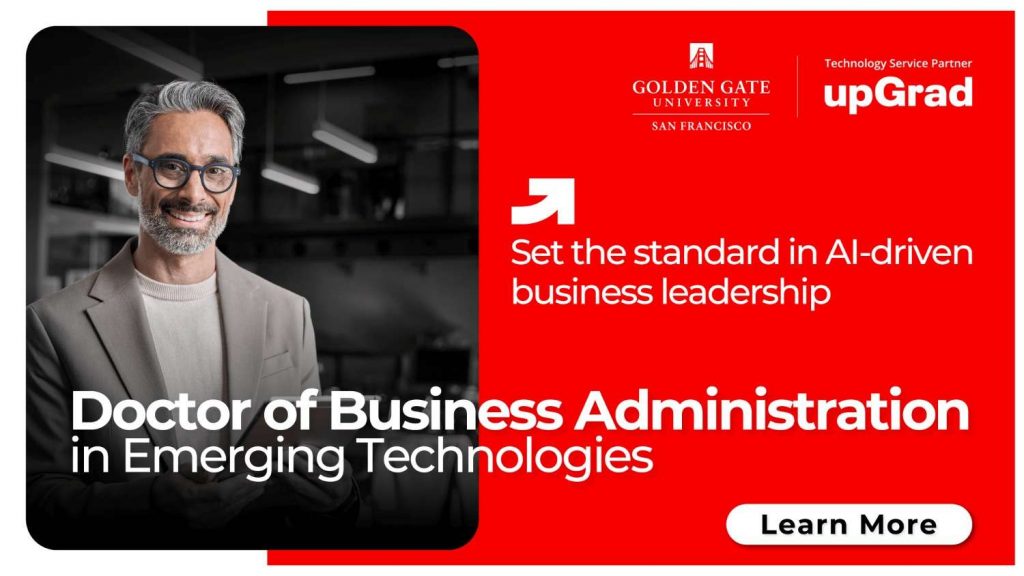In Singapore, human resource management has developed in step with the country’s fast-paced, cutthroat marketplace. Maximizing human capital to support major transformation was the driving force behind the development of national human resource management policies and strategies. Foreign investment still affects Singapore’s human resource management system, which the government has long supported centrally.
Given that Singapore still relies heavily on labor from beyond its borders, it is the right time to pursue a diploma in human resource management to pursue a career abroad. However, if you’re only a little known about this field and need a spotlight on what it is, what responsibilities you may have to take, what skills you’ll need to develop, and more, read this article till the end.
Take your skills to the next level — Explore Online MBA Courses from Prestigious Global Institutions
What is Human Resource Management?
Developing personnel rules and procedures that support corporate goals and strategic plans is a key component of human resource management. Building a culture that upholds fundamental principles and encourages workers to be as productive as they can is essential to this goal.
Also read: 5 Things You Need to Know About Starting a Career in HR
Responsibilities of Human Resource Management
Now that you know what is human resource management, let’s move on to the responsibilities you’ll need to undertake as a human resource manager:
Staffing
A company or a department needs to staff in a number of crucial ways. Hiring managers must first figure out how many new hires the budget can accommodate, then locate and speak with suitable prospects before making decisions and settling on salaries.
Also read: AI in Hiring: What HR Professionals Need to Know?
Creating Workplace Regulations
When it’s decided that a new or updated policy is required, HR specialists usually confer with managers and executives, draft the necessary paperwork, and notify staff members. Vacations, dress requirements, disciplinary measures, and other aspects of workplace practice may all be covered by policies.
Also read: Be a Top HR Manager
Managing Perks and Compensations
Creating perks and compensation schemes is one of the key responsibilities of a human resource manager. It takes careful evaluation of an employee’s years of service with the company, experience level, education, and talents to create such a fair compensation scheme.
Employee Training
Employees are typically more productive and content with their jobs when they acquire new abilities. Team-building exercises, education on policies and ethics, and practical training in skills like operating machinery or computer programs are some of the training programs that HR departments normally oversee.
Also read: Top MBA HR Interview Questions
Skills and Qualities You Need To Fulfill These HR Manager Responsibilities
To support the entire business plan, an HR manager needs to be able to combine strategic thinking, strong and effective communication skills, and problem-solving ability.
Almost every other human resource management degree teaches you to gain a deeper understanding of the staff and establish a deeper connection. You need to possess empathy and emotional intelligence. In actuality, this facilitates forging close bonds with them.
Thirdly and most critically, in order to oversee a group of fellow HR specialists, they also need to have strong leadership abilities and moral principles.
Best Practices For Human Resource Management Professionals
These days, technology is integral to many facets of business. HR managers must, therefore, be capable of the following:
- Lean in and acquire abilities that will be useful in the future.
- Give the employee experience top priority.
- Encourage and cultivate inclusiveness and diversity
- Encourage cooperation and dialogue
- Put employee well-being first
Work together with the leadership to match corporate objectives with HR strategy. In conclusion, these procedures will help HR managers grow and succeed inside the company while allowing them to adjust to the changing nature of the workplace. But where do we learn these practices? For starters, you can explore UpGrad’s online programs in human resource management.
Although not required, earning an HR professional certification from UpGrad can help you advance in your job. Professional certificates demonstrate your expertise in a particular subject, and earning these qualifications will increase your employability.
Also read: Highest Paying HR Jobs in Singapore
Conclusion: Kickstart Your HRM Career With UpGrad
With the breadth of the industry, prospective HR specialists have a lot of opportunities. Additionally, students can develop and refine their skill set and obtain future-ready abilities appropriate for the position of HR manager using UpGrad’s online HR courses.
In order to provide excellent education to everyone, they also partner with esteemed institutions to offer in-demand courses. Explore now!
- Master of Business Administration (MBA), O.P. Jindal Global University
- Master of Business Administration, Edgewood University
- Master of Business Administration (MBA), Liverpool Business School
- Master of Business Administration, Golden Gate University
🎓 Explore Our Top-Rated Courses in Singapore
Take the next step in your career with industry-relevant online courses designed for working professionals in Singapore.
- DBA Courses in Singapore
- Data Science Courses in Singapore
- MBA Courses in Singapore
- Master of Education Courses in Singapore
- AI ML Courses in Singapore
- Digital Marketing Courses in Singapore
- Product Management Courses in Singapore
- Generative AI Courses in Singapore
FAQs on Human Resource Management
On average, a human resource manager earns SGD 69941 per year in Singapore.
Since the pandemic, business expansion has been fast-paced in Singapore, resulting in companies seeking HR professionals for their HRM departments.
HRM focuses on recruiting, training, and managing employees to ensure organizational success and employee satisfaction.
Graduates can pursue roles like HR Manager, Talent Acquisition Specialist, or Learning & Development Manager across industries.
Yes, it’s ideal for working professionals seeking to enhance leadership skills and advance into senior HR or strategic management roles.








